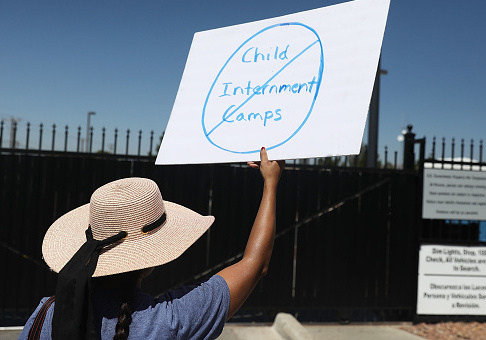U.S. District Court judge Dolly Gee on Monday rejected a government petition to alter a federal agreement governing the detention of children who have illegally immigrated, calling the administration's proposal "procedurally improper and wholly without merit."
Gee’s ruling, responding to a requested alteration ordered by President Donald Trump, throws back into limbo the status of families who are apprehended while attempting to illegally cross the southwestern border.
The Trump administration sought to substantially alter the 1997 Flores settlement agreement, a court-mediated deal between the federal government and representatives of a group of unaccompanied minors. The settlement stipulates that "juveniles be released from custody without unnecessary delay," which judges have subsequently interpreted to mean a 20-day maximum on the amount of time an illegal immigrant who is a minor can be detained.
This stipulation is part of what produced the protracted family separation crisis at the southwestern border in June. The Justice Department implemented a "zero-tolerance" policy along the border, requiring the prosecution of parents and their concurrent remand to custody with the U.S. Marshall Service, while children were held by Health and Human Services rather than be sent to jail.
Children could not be detained with their parents in the custody of the Department of Homeland Security, the administration argued, because to do so would mean holding them longer than the "unnecessary delay" window.
Trump signed an executive order in June officially ending the family separation policy and ordering the detention of parents and children together in DHS-administered facilities. As part of that order, he instructed Attorney General Jeff Sessions to file a request that the California district court modify Flores to permit DHS to do so, even when such detentions cross the preexisting 20-day threshold.
However, Gee ruled, the proposed modification was not appropriate to the current immigration situation; she rejected the government's order that the 2015 order establishing the 20-day threshold had lead to the current levels of family units crossing the southwestern border. She also called the government's argument that a recently ordered court injunction on family separation permitted the changes a "tortured interpretation of the Flores Agreement."
"It is apparent that Defendants' Application is a cynical attempt, on an ex parte basis, to shift responsibility to the Judiciary for over 20 years of Congressional inaction and ill-considered Executive action that have led to the current stalemate," Gee wrote.
The Department of Justice responded by saying it will continue to review the case, although it did not comment on whether or not it would pursue an appeal.
"We disagree with the court's ruling declining to amend the Flores Agreement to recognize the current crisis of families making the dangerous and unlawful journey across our southern border, but the court does appear to acknowledge that parents who cross the border will not be released and must choose between remaining in family custody with their children pending immigration proceedings or requesting separation from their children so the child may be placed with a sponsor," said DOJ spokesman Devin O'Malley.
